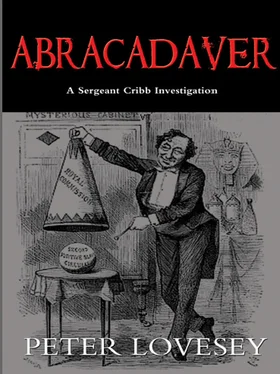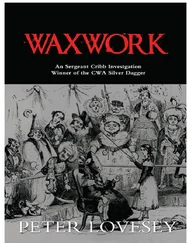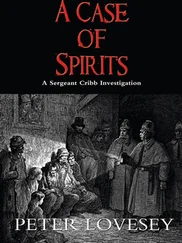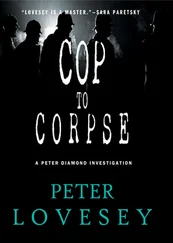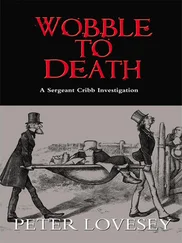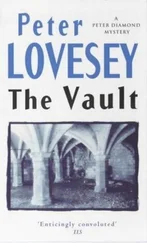‘She’s secure now,’ said Thackeray’s companion. ‘You can help with the scene-removing. There’s no sitting about when the transformation scene’s on, you know.’
Behind the gauze-cloth an exotic scene was almost mounted. A drop decorated with a crudely painted skyline of cupolas and minarets was already in place and a border representing Eastern arches had been flown from the grid. Thackeray joined two men struggling with a profile flat, a piece of shaped scenery representing a section of wall surmounted by palm trees. On the other side of the gauze-cloth Albert’s mother gamely started the fourth verse of ‘Up in a Balloon’.
‘That’s safely home,’ said one of the men, addressing Thackeray. ‘Just secure it, will you, while me and my mate get the small props in place? There’s all them potted plants to go yet.’
He found himself standing alone behind two pieces of scenery with a length of sashcord in his hand, attached to the left-hand flat. It was a long time since he had felt so inadequate.
‘Why, if it ain’t the feller with the beaver again,’ said a voice behind him. ‘Having trouble, are you, Dad?’
It was difficult to look round when one was providing the only support for a large piece of scenery, but he thought he recognised the voice of the red-headed chorus girl. Unless she had found some more clothes he was not inclined to conduct a conversation with that young woman anyway.
‘You don’t know what you’re about, do you?’ she continued. ‘Here. Give the throwline to me.’ She wedged herself in front of him, took it from his hand and tossed it neatly over a cleat, high on the right-hand flat. Then she brought the line back across the join and fastened it below, over two cleats, one on either flat. ‘You tie it with a slippery-hitch like this, so as it’s easy to break when you need to strike the scene.’
‘I’m obliged to you.’
‘You can step away now. It won’t fall down. That is, unless you’ve a mind to remain here pressing yourself against me.’
The very idea! He backed away like a horse from the halter. He could now see her red hair and a good deal more of her besides. She was dressed in a sequinned waistcoat and diaphanous harem trousers. ‘I think I may be wanted on the winch,’ he said.
‘About time,’ said his companion testily, when he got there. ‘I can’t turn this blooming thing on my own, you know.’
Ahead of them, the swinging motion of the balloon-car had stopped and Albert’s mother was completing her final chorus. As the applause—there was not much of it—died away, the blue lights went out and the scene behind the gauze cloth was illuminated. Albert’s mother leaned precariously over the edge of the car.
‘Gentlemen, just look at what my gas-balloon has caught on—
A palm-tree in Morocco in the harem of a sultan!’
‘Right. Lift her clear. Fifteen turns!’ said the man on the winch.
As Albert’s mother ascended into the flies so did the gauze-cloth. Five young women, dressed like the one Thackeray had seen, performed what passed for an Arabesque dance among the props and scenery. Now that the initial shock was over, he could bring himself to look at the scene. The audience, from what he could hear, actually seemed quite friendly-disposed towards the dancers. He supposed that if one had a well-developed imagination—and people of that class unquestionably would have—one might even make a mental journey to Morocco and observe the performance without reference to British standards of decorum. If he tried hard, even a man of his upbringing might manage it. But a nudge in the ribs brought him firmly back to London.
‘Unwind her slowly now.’
Albert’s mother descended, and so did the gauze. Thackeray remained firmly at the winch; others could change this scene. Unbelievably soon, it was time for another couplet:
‘Sometimes, you know, the weather is a menace.
A powerful breeze has blown me over—Venice!’
‘Marvellous!’ exclaimed Thackeray, as the floating city was revealed, complete with moving gondolas.
‘Just turn the handle, mate, or they won’t see anything of it. Blimey, if you think that’s a scene, you ought to go to Drury Lane. They run everything from race-horses to railway-engines across that stage.’
‘It was the transformation that surprised me,’ panted Thackeray, when the fifteen turns were made.
His companion sniffed. ‘Falling flaps. Get a good man up there on the catwalk and you can change a common lodging-house to Buckingham Palace in ten seconds, if you’ve a mind to. Right! Down she comes again, and then you’ll be wanted on the living statues.’
Fifteen turns later, he tottered away to report for his next task. Behind the gauze-cloth, Greece was being constructed, a series of columns secured with stage-braces in front of a cloth depicting the Acropolis.
‘Are you one of the heavies?’ someone asked him.
‘Yes.’
‘Good. This one’s yours. Aphrodite. Keep your head well down, don’t jerk, and watch out for the Thinker coming towards you from the other side.’
‘Aphro . . . ?’
‘Miss Penelope Tring. Get yourself in position and she’ll climb up at once.’
A wooden structure on small wheels, not unlike an upright piano painted white, with two steps on the keyboard side, was waiting for him. Young women with sheets draped about them were standing nearby, ready to go on. He noticed two handles on the back of the structure and gripped them. It moved quite freely. He waited uncertainly.
The last of the footmen quitted the stage and the Grecian maidens arranged themselves behind the gauze-cloth in an arc, leaving free the area ahead of Thackeray. In the opposite wing he could see another of the heavy contingent crouching behind a similar plinth on wheels, but his already supported a white statue. The orchestra stopped playing and Albert’s mother made her final introduction, but Thackeray did not hear a word of it. Miss Penelope Tring was mounting his plinth . . .
Next moment the stage was bathed in light, the orchestra were playing some stately melody and someone was pushing him from behind. Automatically, he began the journey to the other side: automatically, because his mind refused to accept the reality of what he had just seen and could continue to see if he turned his eyes that way. It was manifestly impossible that he, Detective Constable Edward Thackeray of Scotland Yard, was at that moment crossing a stage in a satin suit, crouching behind a conveyance supporting a female person clothed only in white silk fleshings. Never mind the disturbingly life-like male figure being wheeled past on his right; never mind the warmth proceeding from the vaguely rotund areas of whiteness on his left, a few inches from his cheek. Fantasy, all of it. Why, Sergeant Cribb, for all his bullying ways, would never subject a man to such indignities.
‘Hold on, mate!’ a voice at his elbow cautioned. ‘You’ll shove the lady through the wall if you don’t put the brake on.’
As they halted, Miss Tring relaxed her pose and hopped down heavily from the plinth in front of Thackeray, sufficiently substantial to convince anyone else that she existed. Of course he had heard, over pints of ale, of things that happened across the Channel, of poses plastiques and tableaux vivants in Parisian theatres. That unquestionably accounted for the trick of his imagination that had produced the present illusion. Why, if he pinched himself or, better still, reached out a thumb and forefinger to Miss Tring, she would certainly vanish. But something restrained him, and presently the apparition accepted a cloak from someone and walked away to the dressing-rooms.
Above the stage Albert’s mother completed a final chorus of ‘Up in a Balloon’, the curtain was lowered, and so were she and her bulldog, with someone else assisting at the winch. But there was no respite for Thackeray. ‘Carry this to the centre,’ a bystander told him, ‘and place it on the blue spot.’ He found himself holding a species of umbrella-stand made of glittering chromium and containing a formidable array of swords. ‘For the illusionist,’ he was told. ‘Get moving, damn you!’
Читать дальше
